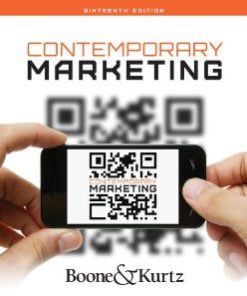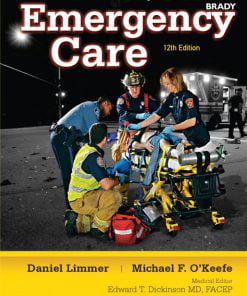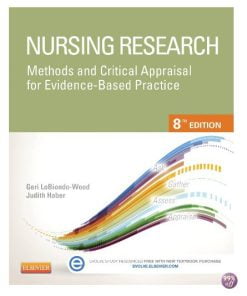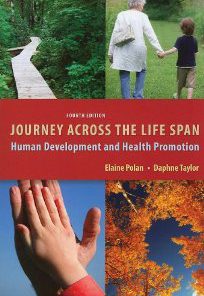Test Bank for Development Through Life A Psychosocial Approach, 12th Edition
$35.00 Original price was: $35.00.$26.50Current price is: $26.50.
Test Bank for Development Through Life A Psychosocial Approach, 12th Edition
This is completed downloadable of Test Bank for Development Through Life A Psychosocial Approach, 12th Edition
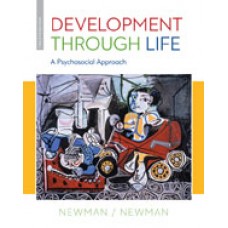
Product Details:
- ISBN-10 : 1285459962
- ISBN-13 : 978-1285459967
- Author: Barbara M. Newman, Philip R. Newman
This text uses a chronological approach to present development across the life span, drawing on the psychosocial theory of Erik Erikson to provide a conceptual framework. The authors address physical, intellectual, social, and emotional growth in all life stages, focusing on the idea that development results from the interdependence of these areas at every stage, and placing special emphasis on optimal development through life.
Table of Content:
- Chapter 1: The Development Through Life Perspective
- Case Study: Ruth Hamilton
- Assumptions of the Text
- A Psychosocial Approach: The Interaction of the Biological, Psychological, and Societal Systems
- The Biological System
- The Psychological System
- Meaning Making
- The Societal System
- The Psychosocial Impact of Poverty
- Overview of the Psychosocial Approach
- Applying Theory and Research to Life: Poverty
- The Life Span
- Life Expectancy
- Group Differences in Life Expectancy
- Gender Differences
- Racial Differences
- Factors That Contribute to Longevity
- Education
- Social Integration
- Diet
- Exercise
- Chapter Summary
- Chapter 2: Major Theories for Understanding Human Development
- Case Study: Jack Manasky and His Daughter Marilyn
- What is a Theory?
- Requirements of a Theory
- Requirements for Theories of Development
- The Theory of Evolution
- Ethnology
- Evolutionary Psychology
- Implications for Human Development
- Links to the Psychosocial Approach
- Psychosexual Theory
- Five Components of Psychosexual Theory
- Motivation and Behavior
- Domains of Consciousness
- Three Structures of Personality
- Stages of Development
- Defense Mechanisms
- Object Relations Theory
- Ego Psychology
- Implications for Human Development
- Links to Psychosocial Approach
- Cognitive Developmental Theories
- Basic Concepts in Piaget’s Theory
- Stages of Development
- Implications for Human Development
- Vygotsky’s Concepts of Cognitive Development
- Lower and Higher Mental Processes
- Culture as a Mediator of Cognitive structuring
- Movement from Intermental to Intramental
- Inner Speech
- The Zone of Proximal Development
- Implications for Human Development
- Links to the Psychosocial Approach
- Theories of Learning
- Social Learning Theory
- Implications for Human Development
- Cognitive Behaviorism
- Implications for Human Development
- Links to the Psychosocial Approach
- Applying Theory and Research to Life: Cognitive Behavioral Therapy
- Cultural Theory
- Cultural Continuity and Discontinuity
- Individualism and Collectivism
- Implications for Human development
- Links to the Psychosocial Approach
- Human Development and Diversity: Implications of Individualism and Collectivism for Parenting Practi
- Social Role Theory
- Implications for Human Development
- Links to the Psychosocial Approach
- Applying Theory and Research to Life: Role Strain and Parenthood
- Systems Theory
- Characteristics of Open Systems
- Ecological Systems Theory
- Implications for Human Development
- A Systems View of Families
- Links to the Psychosocial Approach
- Chapter Summary
- Chapter 3: Psychosocial Theory
- The Rationale for Emphasizing Psychosocial Theory
- Case Study: Erik H. Erikson
- Basic Concepts of Psychosocial Theory
- Stages of Development
- Developmental Tasks
- Psychosocial Crisis
- Psychosocial Crises of the Life Stages
- Applying Theory and Research to Life: Using Autobiographical Memories to Explore Psychosocial Stages
- The Central Process for Resolving the Psychosocial Crisis
- Radius of Significant Relationships
- Contexts of Development
- Coping
- Prime Adaptive Ego Qualities
- Core Pathologies
- Evaluation of Psychosocial Theory
- Strengths
- Weaknesses
- A Recap of Psychosocial Theory
- Chapter Summary
- Chapter 4: The Period of Pregnancy and Prenatal Development
- Genetics and Development
- Chromosomes and Genes as Sources of Genetic Information
- The Principles of Heredity
- Alleles
- Genotype and Phenotype
- Epigenetics
- Sex-Linked Characteristics
- Genetic Sources of Individual Differences
- Genetic Determinants of the Rate and Sequence of Development
- Genetic Determinants of Individual Traits
- Genetic Determinants of Abnormal Development
- Genetic Technology and Psychosocial Evolution
- Ethical Considerations
- Gene X Environment Interactions and Behavior
- Genetics and Intelligence
- The Norm of Reaction
- Normal Fetal Development
- Fertilization
- Twins
- Infertility and Alternative Means of Reproduction
- Ethical Considerations of ART
- Applying Theory and Research to Life: Reproductive Technologies
- Adoption
- Development in the First Trimester
- The Germinal Period
- The Embryonic Period
- The Fetal Period
- Development in the Second Trimester
- Development in the Third Trimester
- The Birth Process
- Stages of Labor
- Cesarean Delivery
- Infant Mortality
- The Mother, the Fetus, and the Psychosocial Environment
- The Impact of the Fetus on the Pregnant Woman
- Changes in Roles and social status
- Being Pregnant Changes a Woman’s Emotional State
- Applying Theory and Research To Life: The Doula or Birth Companion
- Father’s Involvment During Pregnancy
- Father’s Involvment in Labor and Delivery
- Case Study: A Father’s Recollection About His Daughter’s Birth
- The Impact of the Pregnant Woman on the Fetus
- The Impact of Poverty
- Human Development and Diversity: Psychosocial Factors Linked to Preterm Births for African American
- Mother’s Age
- Maternal Drug Use
- Environmental Toxins
- Mother’s Diet
- Stress and Fetal Development
- Summary
- The Cultural Context of Pregnancy and Childbirth
- Reactions to Pregnancy
- Solicitude Versus Shame
- Adequacy Versus Vulnerability
- Human Development and Diversity: Couvade
- Reactions to Childbirth
- Human Development and Diversity: Taegyo (Fetal Education)
- Applied Topic: Abortion
- What Is Abortion?
- The Legal and Political Context of Abortion in the United States
- Statistics about Legal Abortions and the Women Who Have Them
- The Psychosocial Impact of Abortion
- Case Study: Karen and Don
- Men’s Reactions to Abortion Men’s Reactions to Abortion
- Chapter Summary
- Chapter 5: Infancy (First 24 Months)
- Case Study: A Close Look at Mother-Infant Interaction
- Newborns
- Applying Theory and Research to Life: Very Small Babies
- Developmental Tasks
- The Development of Sensory/ Perceptual and Motor Functions
- Brain Development in Infancy
- Sensory/Perceptual Development
- Motor Development
- Sensorimotor Intelligence: Processing, Organizing, and Using Information
- Applying Theory and Research To Life: The Dynamic Development of Stepping
- How Infants Process Their Experiences
- Causal Schemes
- Understanding the Nature of Objects and Creating Categories
- The Prefrontal Cortex and Infant Intelligence
- Communication
- Language Perception
- Babbling
- Communication with Gestures
- Early Grammar Recognition
- First Words
- Attachment
- The Development of Attachment
- Stranger Anxiety
- Separation Anxiety
- Formation of Attachments with Mother, Father, and Others
- Patterns of Attachment
- Parental Sensitivity and the Quality of Attachment
- Applying Life Theory and Research to Life: Is There a Sensitive Period for Attachment?
- The Relevance of Attachment to Subsequent Development
- Critique of the Attachment Paradigm
- Emotional Development
- Emotional Differentiation
- Emotions as a Key to Understanding Meaning
- The Ability to Regulate Emotions
- Temperament
- Case Study: The Cotton Family
- How Caregivers Help Infants Manage Their Emotions
- Emotions as a Channel for Adult-Infant Communication
- The Psychosocial Crisis: Trust versus Mistrust
- Trust
- Mistrust
- The Central Process for Resolving the Crisis: Mutuality with the Caregiver
- Coordination, Mismatch, and Repair of Interactions
- Establishing a Functional Rhythm in the Family
- The Prime Adaptive Ego Quality and the Core Pathology
- Hope
- Withdrawal
- Human Development and Diversity: Sensitive Care in Two Cultures
- Applied Topic: The Role of Parents
- Safety and Nutrition
- Safety
- Nutrition
- Fostering Socioemotional and Cognitive Development
- Father’s and Mother’s Parental Behaviors
- Parents as Advocates
- The Importance of Social Support
- Chapter Summary
- Chapter 6: Toddlerhood (Ages 2 to 4 years)
- Case Study: Alice Walker Goes to the Fair
- Developmental Tasks
- Elaboration of Locomotion
- Language Development
- Semiotic Thinking
- Applying Theory and Research to Life: How the Brain Processes Language
- Communicative Competence
- Language Milestones in Toddlerhood
- Language Development Beyond Toddlerhood
- Human Development and Diversity: Bilingualism
- The Language Environment
- Fantasy Play
- The Nature of Pretend Play
- The Capacity for Pretense
- How Fantasy Play Changes During Toddlerhood
- Theoretical Views About the Contributions of Fantasy Play to Development
- Applying Theory and Research to Life: Imaginary Companions
- The Role of Play Companions
- Self-Control
- Control of Impulses
- Applying Theory and Research to Life: The Expression and Control of Angry Feelings
- Self-Regulated Goal Attainment
- The Psychosocial Crisis: Autonomy versus Shame and Doubt
- Autonomy
- Shame and Doubt
- Human Development and Diversity: Toilet Training
- The Central Process: Imitation
- The Prime Adaptive Ego Quality and the Core Pathology
- Will
- Compulsion
- The Impact of Poverty on Psychosocial Development in Toddlerhood
- Applied Topic: Child Care
- The Impact of Child Care on Intelligence, Cognition, and Academic Achievement
- The Impact of Child Care on Social Competence
- Benefits Associated with Head Start
- Directions for the Future of Child Care in the United States
- Chapter Summary
- Chapter 7: Early School Age (4 to 6 years)
- Case Study: Gloria Remembers Being 5 Years Old
- Developmental Tasks
- Gender Identification
- Case Study: Gender Identification in Early Childhood
- A Framework for Thinking about Gender Identity
- Understanding Gender
- Gender-Role Standards and Sex Stereotypes
- Identification with Parents
- Applying Theory and Research to Life: Children Raised by Gay or Lesbian Parents
- Gender Preference
- Early Moral Development
- Internalization
- Four Theoretical Perspectives on Moral Development
- Case Study: Early Learning about Obedience
- Empathy, Caring, and Perspective Taking
- Parental Discipline
- The Impact of Violent Television and Video Games on Moral Development
- Review of Influences on Moral Development
- Self-Theory
- The Neuroscience of the Self
- The Me and the I
- Developmental Changes in the Self-Theory
- Culture and the Self-Theory
- Self-Esteem
- Self-Esteem and the Early-School-Age Child
- Peer Play
- Group Games
- Media Play
- Friendship Groups
- The Psychosocial Crisis: Initiative versus Guilt
- Initiative
- Guilt
- The Central Process: Identification
- The Prime Adaptive Ego Quality and the Core Pathology
- Purpose
- Inhibition
- Applied Topic: School Readiness
- What Do We Mean by Readiness?
- Measuring Kindergarten Readiness
- Risk Factors for School Readiness
- Who Is Responsible for Meeting the Goal for School Readiness?
- Human Development and Diversity: Supporting School Readiness for Young Children with Disabilities
- Chapter Summary
- Chapter 8: Middle Childhood (6 to 12 years)
- Developmental Tasks
- Friendship
- Family Influences on Social Competence
- Three Contributions of Friendship to Social Development
- Loneliness
- Rejection
- Concrete Operations
- Applying Theory and Research to Life: Bullying
- Conservation
- Classification Skills
- Computational Skills
- Metacognition
- Skill Learning
- Applying Theory and Research to Life: What Is Intelligence?
- Features of Skilled Learning
- Reading
- Self-Evaluation
- Feelings of Pride
- Human Development and Diversity: Cross-National Comparisons of Mathematics Ability
- Self-Efficacy
- Case Study: Becca
- Social Expectations
- Illusions of Incompetence and Competence
- Team Play
- Interdependence
- Division of Labor
- Competition
- Cooperation
- In-group and Out-group Attitudes
- Team Play as a Context for Development
- The Psychosocial Crisis: Industry versus Inferiority
- Industry
- Inferiority
- The Central Process: Education
- Human Development and Diversity: Disorders of Childhood That Interfere with School Success
- The Prime Adaptive Ego Quality and the Core Pathology
- Competence
- Inertia
- Applied Topic: Violence in the Lives of Children
- Consequences of Exposure to Violence
- Preventing Violence
- Chapter Summary
- Chapter 9: Early Adolescence (12 to 18 years)
- Case Study: Evelyn Cabrera: Balancing Autonomy and Closeness in Early Adolescence
- Developmental Tasks
- Physical Maturation
- Applying Theory and Research to Life: Sleep Loss in Adolescence
- Case Study Jordyn Wieber: One of the U.S. Fabulous Five Gold Medal Gymnasts
- Physical Changes in Girls
- Physical Changes in Boys
- Cultural Contexts of Puberty
- The Secular Growth Trend
- Individual Differences in Maturation rate
- Romantic and Sexual Relationships
- The Transition into Sexualized Relationships
- Dating
- First Intercourse
- Sexual Orientation
- Problems and Conflicts Associated with Sexuality
- Parenthood in Early Adolescence
- Formal Operations
- Brain Development in Adolescence
- Piaget’s Theory of Formal Operational Thought
- Six Characteristics of Formal Operational Thought
- Factors That Promote Formal Operational Thought
- Criticisms of the Concept of Formal Operational Thought
- Emotional Development
- The Interplay of Emotion and Cognition
- The Diversity of Emotions in Adolescence
- Eating Disorders
- Depression
- Delinquency
- Applying Theory and Research to Life: Adolescent Suicide
- Membership in the Peer Group
- Cliques and Crowds
- Group Boundaries and Norms
- Parents and Peers
- The Psychosocial Crisis: Group Identity Versus Alienation
- Group Identity
- Cognitive Processes That Support the Formation of Group Identity
- Four Types of Experiences That Build a Group Identity
- Ethnic Group Identity
- Alienation
- The Contribution of Alienation to Group Identity and Individual Identity
- The Central Process: Peer Pressure
- Affiliating with a Peer Group
- Applying Theory and Research to Life: Gangs
- Conflicts Between Belonging and Personal Autonomy
- The Prime Adaptive Ego Quality and the Core Pathology
- Fidelity to Others
- Dissociation
- Applied Topic: Adolescent Alcohol and Drug Use
- Physical Effects of Alcohol
- Factors Associated with Alcohol Use
- Cognitive Factors
- Motivation and Emotion
- The Social Contexts of Alcohol Use
- Chapter Summary
- Chapter 10: Later Adolescence (18 to 24 years)
- Case Study: Growing Up Through Divorce, A College Student’s Insights
- Developmental Tasks
- Autonomy from Parents
- Autonomy and Leaving Home
- Autonomy and the College Experience
- Revision of Attachment to Parents
- Autonomy and Self-Sufficiency
- Applying Theory and Research to Life: Attachment and Identity Formation
- Gender Identity
- The Role of Culture
- Reevaluating Gender Constancy
- Reevaluating Earlier Gender-Role Standards and Learning New Ones
- Human Development and Diversity: Third Genders
- Revising Childhood Identifications
- Adding a Sexual Dimension to Gender Identity
- Integrating One’s Gender Identity
- Internalized Morality
- New Cognitive Capacities
- Stages of Moral Reasoning
- Experiences That Promote Moral Reasoning
- A Maturing Moral Identity
- Career Choice
- Work Experiences in Early Adolescence
- Factors Influencing Career Choice
- Career Decision Making
- Phases of Career Decision Making
- Career Decision-Making Self-Efficacy
- The Impact of the Labor Market on Career Decision Making
- The Psychosocial Crisis: Individual Identity versus Identity Confusion
- Individual Identity
- The Private and Public Faces of Identity
- The Content and Evaluation Components of Identity
- Case Study: Houston A. Baker, Jr.
- Identity Status
- Identity Confusion
- Developmental Progression
- Identity Formation for Men and Women
- The Central Process: Role Experimentation
- Psychosocial Moratorium
- Individual Differences in Role Experimentation
- Case Study: Turning Points in the Identity Process
- Role Experimentation and Ethnic Identity
- The Prime Adaptive Ego Quality and the Core Pathology
- Fidelity to Values and Ideologies
- Repudiation
- Applied Topic: Dropping out of College
- Financial Factors
- Human Development and Diversity
- Academic Preparation
- Personal Factors
- Characteristics of the College Environment
- The Consequences of Dropping Out of College
- Chapter Summary
- Chapter 11: Early Adulthood (24 to 34 years)
- Case Study: Changing Work to Recapture Love and Happiness
- Expanding Theoretical Views of Adult Development
- Social Roles
- Life Course
- Fulfillment Theories
- Competence
- Self-Acceptance
- Self-Actualization
- Developmental Tasks
- Exploring Intimate Relationships
- Readiness to Form Intimate Relationships
- Cohabitation
- Close Relationships Between Partners of the Same Sex
- Readiness to Marry
- Phases in the Selection of a Partner
- Case Study: The Best Valentine’s Day
- Adjustment During the Early Years of Marriage
- Childbearing
- Fertility Rate
- Decisions About Childbearing
- Human Development and Diversity: The Reproductive Career of the Gusii
- Adjustment During Pregnancy and Childbearing
- The Dual Roles of Intimate Partner and Parent
- Nonmarital Childbearing
- Adoption
- The Decision Not to Have Children
- Work
- The World of Work
- Poverty and Career Opportunities
- Career Phases and Individual Development
- Lifestyle
- Pace of Life
- Social Network
- Competing Role Demands
- Health and Fitness
- The Psychosocial Crisis: Intimacy versus Isolation
- Intimacy
- Applying Theory and Research to Life: Attachment Styles and Relationship Formation
- Intimacy in the Work Setting
- Isolation
- Social Anxiety
- Loneliness
- Depression
- Fragile Identity
- Sexual Disorders
- Situational Factors
- Divergent Spheres of Interest
- Enmeshment
- The Central Process: Mutuality among Peers
- The Prime Adaptive Ego Quality and the Core Pathology
- Love
- Exclusivity
- Applied Topic: Divorce
- Factors Contributing to Divorce
- Age at Marriage
- Socioeconomic Level
- Socioemotional Development of the Partners
- Family History of Divorce
- Coping with Divorce
- Attachment to a Former Spouse
- Coping Strategies
- Chapter Summary
- Chapter 12: Middle Adulthood (34 to 60 years)
- Case Study: Reinventing Family in Middle Adulthood
- Developmental Tasks
- Managing a Career
- Achieving New Levels of Competence in the World of Work
- Midlife Career Changes
- The Impact of Joblessness
- Balancing Work and Family Life
- Nurturing an Intimate Relationship
- Characteristics of the Partners
- Partners’ Interpersonal Interactions
- Partners’ Commitment to Nurturing the Future of the Relationship
- Case Study: The Struggle for Commitment to Growth in a Vital Marriage
- Preserving Passion in a Long-Term Relationship
- Expanding Caring Relationships
- Parenting
- Human Development and Diversity: Menopause
- Fathering
- Developmental Stages of Families
- Caring for One’s Aging Parents
- Case Study: A Daughter Cares for Her Ailing Mother
- Managing the Household
- Human Development and Diversity: The Hindu Joint Family
- Managing Resources and Meeting Needs
- Building Networks and Coalitions
- Applying Theory and Research to Life: Homelessness
- Remarriage and Blended Families
- One-Parent Families
- People Who Live Alone
- The Psychosocial Crisis: Generativity versus Stagnation
- Generativity
- Measuring Generativity
- Case Study: My Leadership Journey
- Stagnation
- Narcissism
- Depression
- The Central Process: Person-Environment Interaction and Creativity
- Person–Environment Interaction
- Creativity
- The Prime Adaptive Ego Quality and the Core Pathology
- Care
- Rejectivity
- Applied Topic: Discrimination in the Workplace
- Types of Discrimination
- Sex Discrimination
- Race Discrimination
- Age Discrimination
- Overview of Discrimination
- Disparities in Income and the Occupational Structure
- How Discrimination Perpetuates Itself
- Psychosocial Analysis: Discrimination and Coping
- Chapter Summary
- Chapter 13: Later Adulthood (60 to 75 years)
- Case Study: Reflections on Retirement
- Developmental Tasks
- Accepting One’s Life
- The SOC Model
- Life Goals and Life Satisfaction
- Case Study: Goal Adjustment in Later Adulthood
- Personality and Well-Being
- Illness and Health
- Erikson on Accepting One’s Life
- The U-Shaped Curve of Well-Being
- Promoting Intellectual Vigor
- Problems in Defining and Studying Intelligence in Later Adulthood
- Memory
- Solving Loosely Defined Problems
- Patterns of Change in Different Mental Abilities
- The Interaction of Heredity and Environment on Mental Functioning
- Redirecting Energy to New Roles and Activities
- Grandparenthood
- Human Development and Diversity: Intergenerational Relationships in Various Ethnic Groups
- Widowhood
- Leisure Activities
- Applying Theory and Research to Life: Patterns of Adaptation Widowhood
- Developing a Point of View About Death
- Changing Perspectives About Death
- Case Study: Morrie Schwartz Reflects on His Views About Death
- Death Anxiety
- The Psychosocial Crisis: Integrity versus Despair
- Integrity
- Despair
- Depression
- The Central Process: Introspection
- The Prime Adaptive Ego Quality and the Core Pathology
- Wisdom
- Disdain
- Applied Topic: Retirement
- Income Loss
- Adjustment to Retirement
- Benefits of Retirement
- Difficulties with Retirement
- Case Study: Anna Quindlen Writes About Retiring as
- Retirement for Couples
- The Future of Retirement
- Chapter Summary
- Chapter 14: Elderhood (75 until Death)
- Case Study: Fred Hale, Supercentenarian
- The Longevity Revolution
- Secrets to Longevity
- The Gender Gap Among the Very Old
- A New Psychosocial Stage: Elderhood
- Developmental Tasks
- Coping with the Physical Changes of aging
- Fitness
- Sleep and Rest
- Behavioral Slowing
- Sensory Changes
- Health, Illness, and Functional Independence
- Developing a Psychohistorical Perspective
- Applying Theory and Research to Life: Dementia
- Traveling Uncharted Territory: Life Structures in Elderhood
- Living arrangements
- Applying Theory and Research to Life: The Impact of Gentrification on the Elderly
- Gender-Role Definitions
- Romance and Sexuality
- The Psychosocial Crisis: Immortality versus Extinction
- Immortality
- Human Development and Diversity: The Responsibility of Native Hawaiians for Their Ancestors’ Remains
- Extinction
- Applying Theory and Research to Life: Erikson Coping with Aging
- The Central Process: Social Support
- The Benefits of Social Support
- The Dynamics of Social Support
- The Social Support Network
- The Prime Adaptive Ego Quality and the Core Pathology
- Confidence
- Diffidence
- Applied Topic: Meeting the Needs of the Frail Elderly
- Defining Frailty
- Supporting Optimal Functioning
- The Role of the Community
- The Role of Creative Action
- Chapter Summary
- Chapter 15: Understanding Death, Dying, and Bereavement
- Case Study: Too Late to Die Young
- Mortality and Psychosocial Development
- Definitions of Death
- Advance Directives
- The Process of Dying
- Confronting One’s Death
- The Good Death
- Hospice Care
- Euthanasia
- Ethical Issues at the End of Life
- Death-Related Rituals
- Care of the Body
- Care of the Spirit
- Care of the Surviving Family, Friends, and Community
- Bereavement and Grief
- Human Development and Diversity: The Amish Way of Death
- Bereavement
- Bereavement and Coping with Stress
- Grief
- Grief Work
- Bereavement and Grief Among Older Widows and Widowers
- Five Patterns of Bereavement Among Widows and Widowers
- Factors That Affect the Distress of Survivors
- Unacknowledged and Stigmatized Loss
- Applying Theory and Research to Life: Ambiguous Loss
- Psychosocial Growth through Bereavement
- Chapter Summary
- Appendix the Research Process
- The Scientific Process
- The Positivist Approach to Research
- Scientific Observation
- The Qualitative Inquiry Approach to Research
- Research Design
- Sampling
- Random Samples
- Stratified Samples
- Matched Groups
- Volunteer Samples
- The Qualitative Approach to Sampling
- Research Methods
- Observation
- Case Study
- Interviews
- Surveys and Tests
- Experimentation
- Designs for Studying Development
- Retrospective Studies
- Cross-Sectional Studies
- Longitudinal Studies
- Cohort Sequential Studies
- Evaluating Existing Research
- Ethics
- Glossary
- References
- Name Index
- Subject Index
People Also Search:
development through life a psychosocial approach 12th edition
development through life a psychosocial approach 12th edition download scribd
development through life a psychosocial approach 12th edition test bank download pdf







